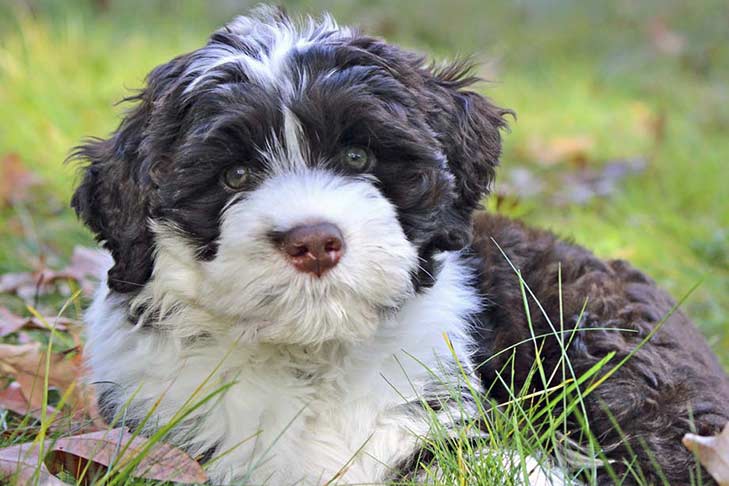Portuguese Water Dog

Portuguese Water Dog:- The Portuguese Water Dog is a loyal, intelligent, and energetic breed that makes a wonderful family companion. Known for their playful nature and strong bond with their owners, these dogs thrive in active households.
Portuguese Water Dog, often called Porties, are famous for their history as working dogs for fishermen in Portugal, where they helped retrieve nets, carry messages, and herd fish. Today, they make excellent pets for families who can meet their physical and mental needs.

Temperament and Personality
Portuguese Water Dogs are known for their friendly and affectionate personalities. They get along well with children, other dogs, and, with proper socialization, even cats. However, due to their high energy levels, it’s important to ensure that they are well-trained from a young age. These dogs can be exuberant and sometimes a bit too rambunctious for very small children, but they are fantastic companions for active, older kids. Porties love to play and are often described as a bit goofy, making them a joy to have in a lively household.
However, like any dog, Portuguese Water Dogs need to be trained to behave gently around children, and children should be taught how to interact with the dogs respectfully. Supervision is recommended when any child interacts with a dog, regardless of the breed, to ensure both the dog and child remain safe.
Are Portuguese Water Dogs Good Family Dogs?
Portuguese Water Dogs are an excellent choice for families that understand and can cater to their unique needs. These dogs are intelligent, which means they need mental stimulation in addition to physical exercise to stay happy. Without adequate mental challenges, Porties may become bored and engage in unwanted behaviors, such as chewing or digging. Their independent streak is a remnant of their working dog heritage, making early and consistent training essential.

While they are loyal and affectionate, they also have a strong independent nature and can be a bit opinionated at times. This means that they are not the kind of dog who will sit quietly for hours on end. They want to be part of everything that’s happening in the home and can be prone to separation anxiety if left alone for long periods. For families who work long hours or are frequently away from home, a Portuguese Water Dog may not be the best fit.
Size and Weight
There is a noticeable difference in size between male and female Portuguese Water Dogs. Males typically stand between 20 and 23 inches tall and weigh between 42 and 60 pounds, while females are a bit smaller, standing 17 to 21 inches tall and weighing 35 to 50 pounds. When choosing a puppy, considering the size of the parents can give you an idea of how large your dog might grow. Regardless of their size, Portuguese Water Dogs are known for their energetic, bouncy nature. They’re the kind of dog that may greet you by jumping up, but with proper training, they can learn to be more polite in their greetings.
Exercise Needs
As a high-energy breed, Portuguese Water Dogs require a significant amount of exercise. At least two 20-minute sessions of running or vigorous play each day are recommended. Due to their working dog background, they also excel in activities like swimming, agility, and dock diving. These dogs were bred to work alongside fishermen, so they have a natural love for the water and enjoy any activity that allows them to swim or get wet.
In addition to physical exercise, Portuguese Water Dogs need mental stimulation. Training sessions, puzzle toys, and dog sports can help keep their minds engaged. Indoor play and brain games are just as important as outdoor exercise for keeping them happy and well-balanced.
Living in an Apartment
While Portuguese Water Dogs are highly active, they can live in an apartment as long as they receive enough exercise. It’s crucial that they get multiple opportunities each day to run, play, and burn off energy. Without enough physical activity, they may become restless and develop behavioral issues. Porties do best in homes where they have space to move around, but they can adapt to smaller living environments as long as their needs are met.
Grooming Needs
Portuguese Water Dogs are a low-shedding breed, which makes them an attractive option for people with allergies. However, they require regular grooming to keep their coat healthy. Porties need to be brushed daily to prevent tangles and mats, and their hair should be trimmed about once a month. For dogs that spend a lot of time swimming, it’s important to properly clean and dry their ears, as well as their skin and coat, to prevent infections.
In addition to coat care, regular maintenance like nail trimming and teeth brushing is necessary. Like all breeds, Portuguese Water Dogs are prone to dental issues, so keeping their teeth clean can help prevent disease.

Training
Portuguese Water Dogs are highly intelligent and respond well to positive reinforcement training. Starting obedience training early, as soon as eight weeks of age, is ideal for preventing bad habits from forming. These dogs love to learn and thrive when they are challenged with new tasks and skills. Training is a great way to bond with your dog and helps channel their energy in a positive direction.
Their intelligence also makes them excellent candidates for therapy work and competitive canine sports. Whether it’s basic commands or advanced tricks, Porties enjoy learning and often excel in obedience training.
Health Concerns
While generally healthy, Portuguese Water Dogs can be prone to a few genetic health issues. Some of the most common conditions include:
– Cataracts: This affects the opacity of the lens in one or both eyes, potentially leading to blindness if untreated.
– Hip and Elbow Dysplasia: This causes degeneration in the joints, leading to pain and mobility issues.
– Progressive Retinal Atrophy (PRA): A condition that leads to blindness as the retina deteriorates over time.
– GM1 Storage Disease: A genetic disorder that affects nerve cells, often fatal and noticeable in puppies around six months of age.
– Juvenile Cardiomyopathy: A hereditary heart condition that can cause sudden death in puppies.
– Distichiasis: An abnormal growth of eyelashes that can irritate the eyes.
To ensure a healthy dog, it’s important to work with a reputable breeder who tests for these genetic conditions.
In conclusion, the Portuguese Water Dog is an affectionate, energetic breed that thrives in active households. With proper exercise, training, and care, they make loyal, loving companions who will be a cherished member of the family.
Also Read:-




